- Home
- Alison Booth
The Painting Page 3
The Painting Read online
Page 3
‘You could always try Sotheby’s or Christies’,’ Tabilla said. ‘They do valuations.’
‘I don’t want to go to a big auction house.’
‘There’s a man I know slightly with a gallery in Paddington. He might be able to help. I expect Magda knows someone too.’
Magda was Tabilla’s oldest friend in Sydney, and she knew all the diaspora, not only the Hungarians but people from all those other waves of refugees who’d washed up in Australia escaping from some war or other. Magda was kind but Anika didn’t want to get caught up in her vast network that criss-crossed Sydney, she didn’t have the time for it. And she did want to see Daniel again.
‘I’ll be late for work,’ she said, kissing Tabilla’s cheek. ‘Love you.’ And she was out the door before her aunt could come up with any more bright ideas.
* * *
At the office, the morning sped by while Anika engrossed herself in the drawings she was working on. Barry, her boss, had done the design, a series of sketch plans and beautifully executed perspectives of a brick and concrete house that was to be constructed on a steep hillside out Mosman way. Her task was to translate his design – all horizontal planes and split levels stepping down the hill – into 1:100 working drawings on sheets of tracing paper. The builders would work from these.
She was about to have a break and try phoning Daniel when Barry appeared at her draughting table, and began to go on and on about the floorplan pinned on the board in front of her. Usually she was glad that he kept her under close supervision but it was now almost three-thirty and if she missed Daniel she’d have to wait till next week to try again. Barry was starting to repeat himself, though she’d understood what he meant the first time he told her. But she held her tongue: he was a lovely man and she was lucky to have this job with him.
‘Yes,’ she told him when he’d talked himself out. ‘I’ll do what you suggest.’
He headed for his office, bursting into a few bars of a song from La Traviata that he’d been practising in his spare time – he was playing the lead baritone role in an amateur production of that opera. He had a beautiful voice but it was so loud that the office partition shook and she feared for the glass. The other two draughtsmen, Tim and Greg, looked up from their draughting tables and grinned.
Once Barry had shut his office door, she dialled Daniel’s work number. Someone else answered, a man with a light voice and a lisp, who told her that Daniel was out of the office. She left a message and at five o’clock she packed up and headed out of the office into the hot streets of Woolloomooloo.
Outside there was a strong stink of car exhaust and the air still felt heavy with humidity. That was what she could never get used to about Sydney in summer: the humidity that she felt was almost tropical. Inlets and bays fragmented the harbour-side suburbs, and that mass of water saturated the air, so that her clothes always felt slightly damp, her hair developed a will of its own and frizzed this way and that, and mildew appeared in the grouting between the tiles in the bathroom.
* * *
The Hero of Waterloo pub had been too hot and Anika wondered if she’d had too much to drink, or perhaps it was more that she’d had too little to eat. A sausage roll and a handful or two of peanuts didn’t take you far, especially when washed down with a few middies. Woozy was the way to describe how she felt, and she was glad to go out into the fresh air.
Some of Anika’s friends stood chatting on the pavement outside the pub. The Hero was on a corner, a sandstone building with its original Georgian character little altered, which was one reason it was loved by architecture students. The cooling breeze was a welcome relief after the heat of the pub and Anika could feel the sweat on her face evaporating.
‘Anika!’
She jumped. The voice from behind her was unmistakably Daniel’s.
‘I’m so pleased to see you,’ he said.
‘Small world.’ Anika tried to speak slowly, wanting to give herself time to breathe, wanting to still the ridiculous knocking of her heart against her ribcage. ‘It’s pronounced Uh-nee-ka.’ Daniel was about a metre away, but the street was sloping down and she could look straight into those dark eyes from which the streetlamp was reflected.
‘Not arnica then,’ he said. As if guessing her lack of comprehension, he added, ‘Arnica’s an ointment used to soothe bruises.’
‘Balm for the body, is that what you mean?’ She regretted these words as soon as they flew from her lips; they could easily be misinterpreted. Quickly she added, ‘It’s good to see you. I hoped you’d ring back.’
‘I got your message after a meeting this afternoon. I would have called you but I’ve been so busy.’
‘So have I,’ she said, grinning. ‘A hard night at the Hero.’
He laughed. ‘And I’ve had a tough evening at the pub at the bottom of George Street. You’re a student, right?’
‘Part-time.’
‘What are you studying?’
‘Architecture.’
‘Really?’ He couldn’t keep the astonishment out of his voice. When he’d recovered – to his credit it didn’t take him long – he said, ‘So you’ve studied art history?’
‘That’s next year.’
Now they had that established, they carried on chit-chatting for a while. The others had moved away and Anika could see, further up Lower Fort Street, Sally and another friend, Peter, standing next to Sally’s car while they waited for Anika. Sally lived in Gladesville a few suburbs west of Rozelle and had offered Anika a lift home.
Daniel began to tell Anika about the fine arts degree he’d finished a few years ago and his wonderful lecturers and he couldn’t resist mentioning his high distinctions. Most men were full of themselves, she told herself before realisation dawned that he was trying to impress her, and she found this thought touching.
When he drew breath, she said, ‘How can I get my painting valued?’
‘Would Wednesday fortnight suit you? I made a tentative appointment at five o’clock with this really great guy who’s an expert in Impressionism. I’ll drive you there if you like.’
After thanking him, Anika gave him her address. Her accent sounded even to her ears more Hungarian than usual, the way it always did when she was feeling emotion – of any kind. ‘This is very kind of you.’
‘It’s quite a long time to wait, Anika, but it was the earliest appointment I could get.’
There was a silence while she struggled to think of how to answer. No worries might be the appropriate response, or even not a problem. She was about to try this out when he said, ‘Have you been to any of the Northern Beaches?’
It had been months since she’d been out of the inner city and his invitation conjured up images of sunlight and the Sydney School Impressionist paintings that Daniel had mentioned the day they met. ‘I’ve been to Manly, does that count?’
‘That’s certainly on the northern side of the harbour,’ he said, smiling. ‘I’m heading north on Sunday for a surf and wondered if you’d like to come.’
Her stomach squirmed with what might be excitement but could be apprehension too. And then there was the thought of her shabby old swimsuit; she could really do with a new one. She said, ‘I’ve never been anywhere further north than Manly.’
‘Time for an adventure then.’
Once they’d made the arrangements, he headed down the side street, while she danced up the hill to where Sally and Peter were waiting. Even she recognised that her elation was not solely to do with getting her Rocheteau valued. Her excitement was only a little bit to do with Daniel, she told herself; it was mostly about the prospect of visiting a beach on the northern side of the harbour, where there’d be bushland, and hardly any people in the surf, and the sand wouldn’t be marked out with footprints like Bondi.
* * *
Goodnight, darling family, she told
the photograph on her bookshelves later that evening, as she did most nights when she was preparing for bed. She picked up the photo and examined her family. Lined up outside Molnars’ Butchers, they were graded by size like beasts at a market. Anika as a ten-year-old, her brother Miklos three years older, her paternal grandmother Nyenye, and her parents. Miklos’s face was angelic and Anika’s grimacing. His hand, casually resting on her shoulder, was secretly yanking her hair that had been styled into loose curls for the photograph. Anika’s lovely mother and Nyenye were smiling in their frumpy overcoats and headscarfs. Her father might have been waiting for a firing squad rather than the click of a camera. Above their heads, slightly out of focus, was a large mural of a cow with all its body parts labelled as cuts of meat. The family shop looked like something from the 1950s, although the photo had been taken in 1975.
Anika felt a pang of homesickness. It was frustrating not being able to talk properly to her family – not in disguised sentences or about banal topics but to really talk about the things that mattered. It was Friday night here, Friday early afternoon there, and she wondered what they were doing right now. Her parents would be at work, that was easy to predict. Miklos could be up to anything, and so could Nyenye. And at this moment it was her mother and grandmother whom she missed most. The being-able-to-hold-them, to hug them, to talk about everything that was happening in her life. Her work, the trip to the gallery, the news about the portrait, and maybe even about Daniel. She put the photograph back and glanced up at the portrait. It made her smile: it really was a magnificent work of art. ‘Goodnight, beautiful auburn-haired woman,’ she said aloud. ‘Thank you for all the good things you’re bringing into my life.’ The new opportunities, the opening of new doors, a way of meeting new people. Nothing but good could come from this picture.
After switching off the lamp, she pushed aside the curtains for a moment. Apart from the street lights, the road was in darkness. Skeins of cloud trailed across the indigo sky, veiling the half-moon, and she could feel the temperature drop degree by degree, second by second, as the breeze metamorphosed into something stronger. Shivering, she climbed into bed and snuggled under the blankets. Shortly afterwards, she was lulled into sleep by soothing fantasies of waves that rolled endlessly on to the shoreline. Outside, the wind rattled Mr and Mrs Opposite’s front gate and fingered the loose corrugated iron of someone’s roof, and a couple of cats down the road fought over something – a fish head perhaps – but tonight nothing was to disturb Anika’s sleep.
* * *
The next morning she awoke late. The southerly change had blown away the dust and pollution, and the fresh-washed day was so brilliant it made you glad to be alive. On her way to the corner shop for the newspaper and some groceries, she bumped into Mrs Thornton, the old lady next door, who was sweeping her front verandah as she did every Saturday morning and most other mornings besides. The perfect excuse to monitor the street and catch up on people’s news.
‘Have you had a good week, dear? Glad to hear it. Not working too hard then. You’re only young once, that’s what I always say, make the most of it. Heard you getting home last night.’
‘Sorry. Was I noisy?’
‘I was awake anyway. I’d just gone upstairs. It was only the car door slamming, and then there was the wind. By the way, there was a man looking for you yesterday. He didn’t know which house you lived in but knew it was a stone terraced house. As soon as he gave me your name I was able to tell him which. Must have been early evening after your aunt went out. I told him you weren’t at home but he knocked on the door anyway.’
‘What did he look like?’
‘Tall with thick fair hair, and on the wrong side of thirty. He said his name was Jonno.’
The Jonno who’d taken Anika for coffee at the café opposite the art gallery, Anika thought, and wondered what he wanted. ‘I’d better get going,’ she said. ‘Would you like me to get you anything from the shop?’
‘I’ve already been, love. But ta anyway.’
Further up the street, outside the rundown terraced house that the landlord refused to spend any money on, Ty Nguyen was cleaning the ute that he’d had for a couple of months. Every Saturday morning the ute got washed and polished. It was his third job that gave him enough cash to buy it. Moonlighting, such a graphic word. Though the black economy thrived here, it was tiny compared to Hungary, where everyone was struggling to make ends meet, the success of gulyás communism nothing more than a chimera.
Just before the dogleg in the street that led to the corner shop, Anika passed the house that two women her age were renovating. This morning there was a heap of bricks in their front yard. Penny was mixing sand and cement on a sheet of plywood while Jane was laying bricks to raise the height of the low wall in front of the house. While Anika watched, Jane plunged a brick into the big bucket of water on the path next to her, before smearing cement on to it and slapping it on to the top of the wall. She did it neatly, so the brick lay square and level, and then she tamped it down with the handle of her trowel.
A sundried elderly man Anika hadn’t seen before stopped next to her and critically examined what Jane was doing. ‘You need a spirit level for that love,’ he said. ‘And a plumb bob. You hang that from a bit of string and it gives you a vertical reference line.’
Jane looked up. ‘Don’t need that, mate,’ she said pleasantly. ‘I’ve got a good eye.’
Penny, who was continuing to combine sand with cement, cut into the mixture harder than necessary with her trowel. On the ground next to her were a spirit level and a plumb bob. She looked up, caught Anika’s eye and winked. As Anika moved on, Mr Know-it-all started offering more advice. Soon after, another couple joined him and a lively conversation was beginning.
Outside the corner shop, a woman in a T-shirt and pants that were a size too small was fingering the oranges displayed in a rack. She picked up each one and squeezed it, before putting it into her plastic shopping basket next to a couple of rolls of toilet paper. They never had oranges when Anika was growing up in Budapest. They often didn’t have toilet paper either. People cut up newspapers into squares and threaded these through a piece of string suspended from a hook next to the toilet.
Community spirit, Anika thought as she paid for her purchases; it was almost like a village here in Boggabri Street on a Saturday morning. Everyone knew what their neighbours were up to. That had made it easy for Jonno to figure out where she lived. She hoped he wasn’t going to become a nuisance. She’d liked him but there was something threatening about him. Perhaps it was his size, perhaps it was his persistence. She couldn’t quite put her finger on what it was.
Chapter 4
On Sunday morning Anika was ready much too early. Wearing a loose green dress that would be easy to pull on and off for swimming, she dumped her swimming things in a canvas tote by the front door and went into the downstairs front room to wait for Daniel. She could hear Mrs Thornton sweeping her front verandah again.
The curtains in the front room were still drawn and the room was gloomy. The sight of a woman in front of the folding modesty screen made Anika jump until she realised it was only Flossie. A fully adjustable dressmaking dummy, Flossie was modelling Mrs Barling’s bridal dress – it would be Mrs Barling’s second marriage – a bright blue confection tightly fitted over the bust and hips, with a matching bolero bolstered out with shoulder pads. Flossie had twelve dials for Tabilla to play with, so that Flossie could range from a sylph-like build to a tall buxom shape. At the moment, she was somewhere in the middle, just like Mrs Barling.
Occasionally Anika glanced through the window. Mrs Thornton had now finished sweeping and Anika heard her front door slam. Maybe Daniel was running late. She checked her watch but it was not even ten o’clock yet. After straightening her dress, she examined her reflection in the cheval mirror and smoothed down her recalcitrant hair. Closer to the time Daniel said he would collect her, she
watched the street closely; her aim was to get away promptly without running into Mrs Thornton or having to introduce Daniel to Tabilla. After the end of her relationship with Frank, Tabilla liked to inspect the men she went out with. ‘It’s not that you’ve got really bad judgement,’ she said. ‘It’s just that I can ask the sort of question that you mightn’t think of and that gives you more information.’
The street was one-way, and as soon as Anika saw a vehicle she didn’t recognise – it was a yellow VW Beetle – passing slowly by the house, she collected her bag and opened the front door while Daniel parked his car further up the street.
She’d locked the door before he had time even to open the gate of Tabilla’s tiny front yard. He was wearing brown sandals, shorts the colour of white coffee and an orange and white flowered Hawaiian T-shirt hanging loose. He raised his sunglasses as she opened the gate, the better to fix her with his dark eyes.
‘You look lovely,’ he said. ‘That green dress suits you.’
You look pretty good yourself, she was about to say, before caution got the better of her and she coughed instead. Daniel relieved her of her swimming bag but not without a little tussle, their bodies so close she could smell the faintly spiced deodorant he used and the scent of freshly laundered cotton. As she got into the car, the net curtain twitched: Tabilla – and Flossie – were witnessing their departure, and she’d bet that, next door, Mrs Thornton was as well.
Daniel certainly could talk. You might have called him a windbag if he hadn’t been so interesting. Their journey over the bridge and up to Roseville Chase and French’s Forest was a voyage through the Australian Impressionist School and Early Modern and on to Abstract Expressionism. Her head was reeling by the time she glimpsed the ocean. They descended through bushland to the coast, before winding their way further north. Beach after beach, until they stopped, nose into the kerb, and saw, beyond a row of Norfolk pines, lines of breakers rolling in. There was a cluster of sun umbrellas towards the south end of the beach, near the tidal pool and the Surf Life Saving Club, and in the ocean a few body surfers in the area between the flags.

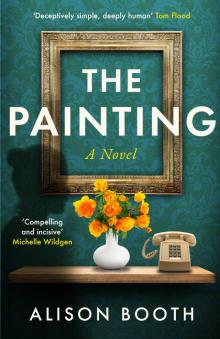 The Painting
The Painting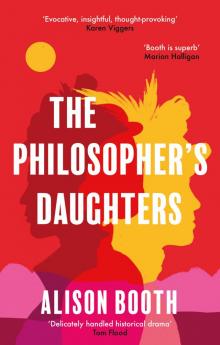 The Philosopher's Daughters
The Philosopher's Daughters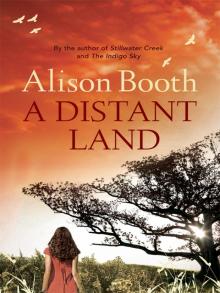 A Distant Land
A Distant Land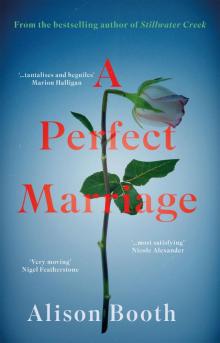 A Perfect Marriage
A Perfect Marriage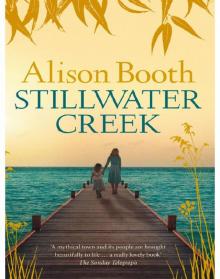 Stillwater Creek
Stillwater Creek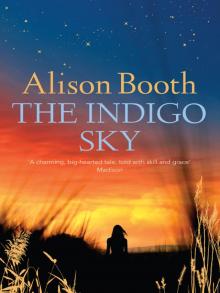 The Indigo Sky
The Indigo Sky